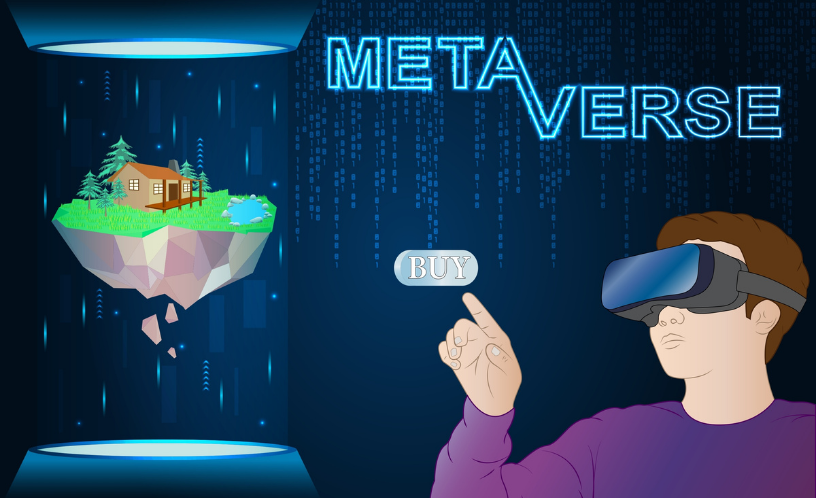Real estate, property taxes, NFTs, and the Metaverse

What a headline. If it sounds crazy, it’s because it is. But it’s still the future.
A mentor of mine uses an oft-repeated phrase I’ve taken to heart. “Major real estate market shifts take much longer to begin than you think. But when they do begin, the acceleration (or deceleration) into those shifts happen faster than most expect.” That philosophy is true for technology as well.
The disruptive technologies and the new normal we envision often take a while to gain traction. When they do, the shift is so dramatic it catches many off guard. This leaves those who haven’t been following those trends scratching their heads, wondering where it came from.
In early February 2022 I posted a survey on LinkedIn asking the LI community whether they felt NFTs in real estate were a fad or the next big thing.
· 60% said they were a fad
· 27% felt they were the future
· 13% had no idea what I was talking about
The respondents and their backgrounds didn’t cut a clear line, either. Some very tech savvy people by trade and education were sold on NFTs; some were not. And it wasn’t necessarily around whether NFTs are legit – it was whether they could prove useful in real estate. Before we dive into NFTs and real estate, let’s cover the basic question, “What is an NFT?”
NFT stands for Non-Fungible Token. It’s a unique digital representation of an asset that is stored on a blockchain. This digital representation could be of a photo, a piece of software, a car, or even real estate. The NFT can be bought and sold like any other asset, and ownership of the NFT is recorded on the blockchain. No one can change ownership or copy the NFT itself, although copies can be made of the underlying asset if it is a purely digital asset, such as a digital photo. So, do NFT’s have a future in real estate? Yes. Is it a game changer? Probably, but not in the way you might think.
Right now, most of the headlines surrounding NFTs and real estate involve people buying virtual properties via NFT in the Metaverse to be close to Snoop Dogg’s virtual mansion. But make no mistake: like my dad used to say, “something is only worth what someone else is willing to pay for it.” And right now, some real estate NFTs or virtual real estate are white hot and exorbitantly inflated. Why? Because this market is still in fad phase. And for anyone telling you that virtual real estate NFTs are an “investment,” I have beachfront property in Arizona I’d like to sell you.
Virtual real estate in the metaverse that is secured by NFTs is, pardon the pun, virtually unlimited. And, there is no single metaverse. Anyone can build a 3D environment and sell their own virtual assets with ownership secured by NFTs. There are currently some metaverse(s) that are more popular than others, which drives up demand and prices. However, today’s popular virtual world may be tomorrow’s myspace.
Sometimes, the current popularity of a particular metaverse is solely because the developers have convinced (or paid) celebrities and others to “be” in there. Despite the current environment, I do believe real estate NFTs have a very bright future in the real world.
Think of an NFT as a unique digital fingerprint that you can assign to anything. Once you have it, and it’s recorded on a blockchain, it’s uniquely yours. In the real world, in order to buy actual real estate, it requires you to engage with multiple intermediary parties that help establish trust through the transaction. Think title insurance and deed recordation. Then think about all of those piles of documents you have to sign that are meant to establish a chain of ownership linked to you, the buyer. A real estate NFT can in fact live on a blockchain as it does now, containing all of the valuable unique rights needed to maintain proof of ownership until you decide to sell that real estate to someone else. Fewer costs, less “paperwork”, more trust, and less friction. That’s a valuable recipe.
Real estate NFTs also have potential to contribute to the greater good. Here’s one example. In many countries in Africa, certain land conveyance and property taxation processes lack trust because of corruption or fraud. Building a system where NFTs are employed to reduce transactional friction (improving trust) in the market could be a game changer.
Bottom line: In my opinion, NFTs will usher in a new wave of evolution in real estate, but it won’t be because you now have the opportunity to buy that virtual bungalow from Usher in the metaverse. (ALERT: Spot the dad joke.)
BACK TO ARTICLES